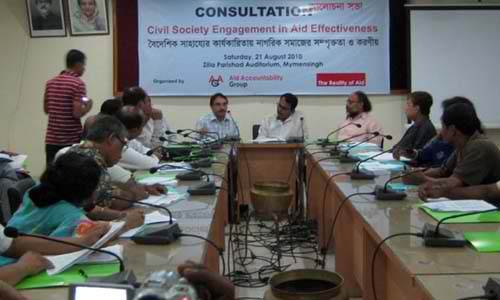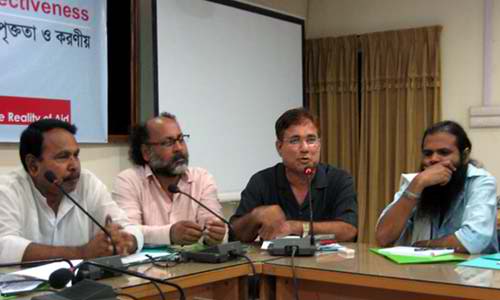A day-long consultation on “Civil Society Engagement on Aid Effectiveness” was held at the District Council Auditorium in Mymensingh on 21st August 2010. Jointly organized by Aid Accountability Group (AAG) and The Reality of Aid Network, 70 participants along with the local government representatives, political leaders, social workers, women organizations, NGOs, human rights organizations, journalists and activists of greater Mymensingh region participated in the program. Upazilla Chairman of Mymensingh Sadar Mr. Faijur Raman Fakir was present as chief guest while Yazdani Quraeshi, President of Supro (Campaign for Good Governance-CGG) Mymensingh district presided over the meeting.
Ahmed Swapan Mahmud, Convenor of AAG facilitated the meeting. Among others ex-Member of Parliament from Mymensingh constituency Delwar Hossain Khan Dulu, Chairman of Animal Husbandry Research Foundation of Bangladesh Agriculture University Professor Mohammad Shamsuddin, Director of Higher Secondary Education Teachers Training Institute Professor Rikta Roy, Executive Director of Sehra Bahumukhi Shomaj Unnayan Shomiti Sheikh Sultan Ahmed, Secretary General of Bangladesh Human Rights Commission Advocate Nazrul Islam Chunnu, General Secretary of Mymensingh Press Club Ataul Karim Khokon, Vice-president of CGG Advocate Imdadul Haque Selim, Executive Director of Lokoj Institute Arup Rahee, Director of Mymensingh Chamber of Commerce Shankar Saha, General Secretary of Mymensingh Women’s Association Sajeda Begum Saju, Executive Director of SKS Tangail Tapan Gun spoke and shared their experiences.
Chairman of Mymensingh Sadar Upazilla Faijur Rahman Fakir said, including the Local Government Support Project, hundreds of aided projects are implemented through the local government. And although the Upazilla Chairman acts as a distribution channel of the development fund, he knows nothing about the project policy or aiding factors and thus can’t take action to monitor the effectiveness of the project. He suggested to form an independent project watch group for the implementation and monitoring of the aided projects and demanded to include the local representatives. He also added that Bangladesh has achieved a good record of economic progress in last two decades, though still there are many weaknesses. If the aid money can be more effective, the achievement can be more visible and justified with the objectives of poverty alleviation. He further said that the NGOs should coordinate well with local governments and policy makers to realize the objectives for aid effectiveness while NGOs also should exercise downward accountability to the people.
Former Member of Parliament Mr. Delwar Hossain Khan Dulu said that not only the government, but also the opposition political parties and the CSOs should be counted in the decision making process for aid channelling at the local level during project formulation, implementation and monitoring levels. He said, lots of project are running in the name of development, but there is no process to monitor whether it is properly working or not. He also added that NGOs should ensure their effectiveness using aid money which is brought for poverty reduction from the donors. However, common people are always left out to be actively engaged, and effectiveness of activities can not be measured. He also suggested better coordination among the CSOs/NGOs in working at the community level to avoid duplication of activities.
Prominent civil society activist and Executive Director of Sehra Bahumukhi Shomaj Unnayan Shomiti Sheikh Sultan Ahmed said, coordination among donors, government and the CSOs should be ensured; a tri-party downward accountability process should be developed to ensure the effectiveness and accountability of aided projects. He asked CSOs to use the Monitoring Matrix for the implementation of Accra Agenda for Action in their own projects to assure their own accountability as well as development effectiveness. He further said that NGOs have good record in Bangladesh for empowering communities, however, they need capacity development for monitoring projects.
The meeting also discussed the Joint Cooperation Strategy (JCS) already signed by 15 donor agencies. The participants said that JCS process should have included the NGOs/CSOs for its better exercise. They claimed that donors and government must ensure participation, transparency and accountability.
Issues causing the failure of aided projects should be investigated carefully. In addition, root casues of bad projects run by the International Financial Institutions (IFIs) should be identified and donors should care about issues (like environment, livelihood and localizations), complying with their own accountable mechanisms and country system. The participants criticised some of the bad projects of Asian Development Bank (ADB) referring to the examples of Khulna-Jessore Drainage Rehabilitation project (KJDRP) and the Sundarbans Biodiversity Project (SBCP) which brought about negative impacts to the life and livelihood of the community people.
Participants demanded to publish the treaties and agreements signed between the donors and the government so the CSOs can take an active role to observe the implementation process of the projects. Some proposed to set a notice board in every local government office to show detailed information about the project.
Arup Rahee of Lokoj Institute said, we accepted all the dogmas of development without any analysis. He said, this is the time for the CSOs to analyse and criticise the development theories. Without proper understandings, it is not possible to engage in aid distribution channel or in the process of aid monitoring, he added.
Ahmed Swapan Mahmud, Convenor of AAG and Executive Director of Voice, in his presentation said, that in Bangladesh, debt burden per capita was only USD6 in the 1970s which ballooned to USD156 now. Contribution of aid in GDP of Bangladesh is only 2.3 percent and the country allocates 14 percent of its National Budget annually for debt servicing. He argued if aid effectiveness can be ensured rightly, Bangladesh economy could run independently without aid money ahead of many developing countries.
He also discussed the role of NGOs and CSOs to ensure their accountability and develop a set of principles to make aid more effective vis-a-vis development effectiveness. He presented how the civil society organizations has been playing active role in the global process of aid effectiveness and urged the NGOs to actively take part in country processes to realize and achieve a common goal of development effectiveness.
He said that four percent of the NGOs of Bangladesh expenses 86% of total aid money while 96% NGOs get the rest. Yet due to lack of accountability and efficiency and bureaucratic process, they cannot take an active role for the effectiveness of aid. However, big NGOs should concentrate more in aid effectiveness as they use most of the aid money for development programmes.
He analysed the perspectives of Paris Declaration on Aid Effectiveness and Accra Agenda of Action and urged NGOs/CSOs to follow up their actions in line with these principles to ensure development effectiveness. Based on the declaration, the participants demanded that donors should pay respect to the principles of PD and AAA and called them to work more closely with the local NGOs. They demanded to ensure NGOs participation in the Paris Declaration evaluation process in the country so that they can contribute.
Former Member of Parliament of Mymensingh Mr. Delwar Hossain Khan Dulu addressing the consultation; in his left Arup Rahee, ED of Lokoj Institute and right Yazdani Quraeshi, President of Supro (Campaign for Good Governance-CGG)


